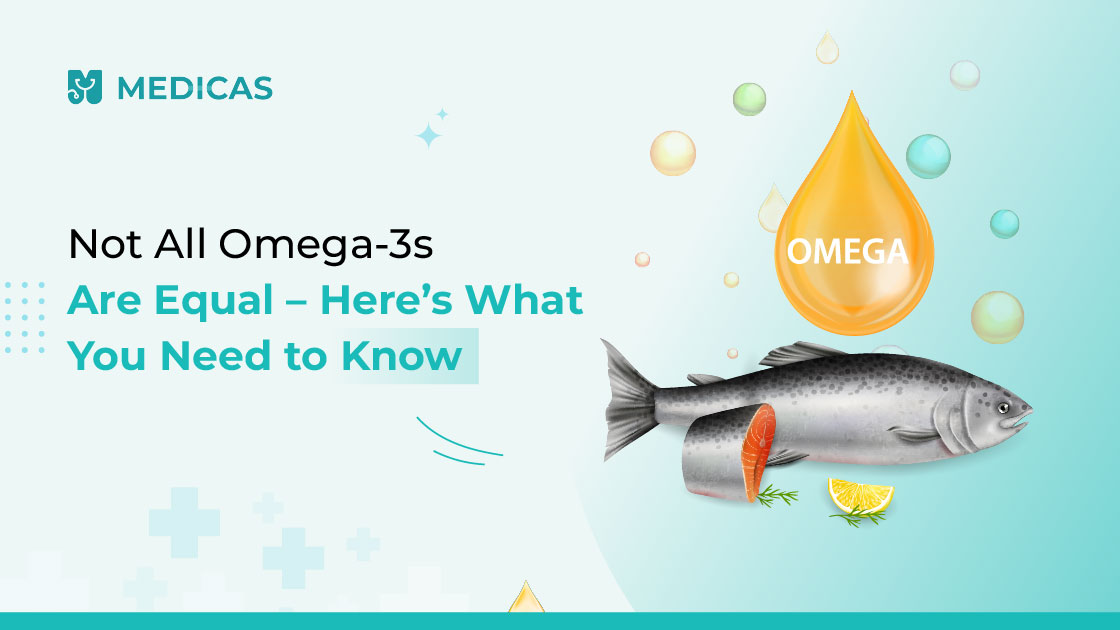When you hear “omega‑3,” you probably think of fish oil capsules lining pharmacy shelves. Yet plant‑based sources—from flaxseeds to algae—offer an alternative for vegetarians, vegans, and anyone concerned about sustainability. Choosing between fish oil and omega-3 supplements isn’t just a matter of preference; it also affects absorption, environmental footprint, and dietary fit.
In this blog, learn the difference between omega-3 and fish oil, and pick the best source for your health.
Understanding Omega-3 Fatty Acids
What Are Omega-3 Fatty Acids?
Omega‑3 fatty acids are essential polyunsaturated fats that the body cannot synthesise and must obtain from diet or supplements.
Types of Omega-3s: ALA, EPA, and DHA
There are three main types:
- ALA (alpha‑linolenic acid): Found in omega-3 plant-based foods like flaxseeds. The body partially converts ALA into EPA and DHA.
- EPA (eicosapentaenoic acid): Mainly in fish oil.
- DHA (docosahexaenoic acid): Abundant in fatty fish and DHA-rich vegetarian food sources such as algal oil.
Understanding these differences is key when weighing fish oil vs omega-3.
Why Omega-3s Matter for Health
Regular omega-3 intake supports:
- Lower triglycerides and better heart health
- Reduced heart disease risk and stable heart rhythms
- Healthy blood vessels and blood pressure
- Improved brain function and cognition
- Reduced inflammation (e.g., arthritis, skin issues)
Whether you choose vegetarian omega-3 or marine-derived EPA/DHA, ensuring adequate intake supports overall well‑being.
Also Read: Natural Remedies: The Secret to Effective Obesity Treatment
Fish Oil: Source and Benefits
What Is Fish Oil and How Is It Made?
Fish oil is extracted from oily fish, such as salmon and sardines, which obtain omega-3s (DHA and EPA) from microalgae. The oil is purified and used to make supplements.
Is Fish Oil Vegetarian-Friendly?
No—fish oil is derived from animal sources, so it is not suitable for omega-3 fatty acids vegetarian diets; vegetarians and vegans must turn to plant-based omega‑3 alternatives.
Also Read: 8 Ways of How to Lead a Healthy Lifestyle on a Tight Budget
Plant-Based Omega-3: A Sustainable Alternative
Sources of Vegetarian Omega-3 Fatty Acids
Many plant foods are rich in ALA, such as:
- Flaxseeds and flaxseed oil
- Chia seeds
- Walnuts
- Hemp seeds
- Canola oil
- Algal oil
Benefits of Plant-Based Omega-3 Oils
- Sustainable production: Less environmental impact than fish harvesting.
- Suitable for all diets, including vegetarian, vegan, and those with fish allergies.
- Antioxidant co-nutrients: Flaxseeds and chia provide polyphenols and fiber alongside ALA.
While ALA conversion to EPA and DHA is limited (~5–10%), plant-based omega-3 oils remain valuable in balanced diets.
DHA-Rich Food for Vegetarians
Algal oil capsules stand out as the primary DHA-rich vegetarian food supplement, offering direct DHA without the need for fish. Some fortified foods, such as plant milks and yogurts, also add algal DHA, making it easier to meet daily requirements.
Also Read: Understanding Diabetes: Causes, Types, and Risk Factors
Fish Oil vs Omega-3: Breaking Down the Difference
Nutritional Profile Comparison
When comparing omega-3s vs. fish oil, the biggest difference lies in the EPA and DHA content.
| Source | Type | ALA (g) | DHA (g) | EPA (g) |
| Flaxseed oil (1 tbsp) | Plant-based | 7.26 | – | – |
| Chia seeds (1 oz) | Plant-based | 5.06 | – | – |
| Walnuts (1 oz) | Plant-based | 2.57 | – | – |
| Canola oil (1 tbsp) | Plant-based | 1.28 | – | – |
| Salmon, Atlantic (3 oz, farmed) | Fish-based | – | 1.24 | 0.59 |
| Herring, Atlantic (3 oz) | Fish-based | – | 0.94 | 0.77 |
| Sardines (3 oz, canned) | Fish-based | – | 0.74 | 0.45 |
| Mackerel, Atlantic (3 oz) | Fish-based | – | 0.59 | 0.43 |
| Trout, rainbow (3 oz, wild) | Fish-based | – | 0.44 | 0.40 |
Fish oil delivers pre‑formed EPA/DHA, whereas plant-based omega-3 fatty acid sources rely on ALA with limited conversion, except algal oil, which provides both EPA and DHA directly.
Absorption and Effectiveness
ALA conversion to EPA is about 5–10%, and to DHA only 2–5%—factors like a high omega‑6 diet can reduce this further by up to 50%. Direct EPA/DHA sources, such as fish oil and algal oil, bypass this inefficiency, offering more predictable blood levels.
Health Risks and Sustainability Factors
Fish oil may carry risks like:
- Contaminants (mercury, PCBs)
- Stomach discomfort
- Fishy aftertaste
From an environmental angle, overfishing for omega-3 sources raises concerns. Plant-based omega-3 supplements are a much more sustainable and cruelty-free choice.
Also Read:The Role of Nutrition in Diabetes Management
Best Omega-3 Capsules for Vegetarians
Top Vegetarian Omega-3 Supplements in the Market
- Algal DHA/EPA blends: Pure microalgae extract, free from marine toxins.
- Flaxseed oil capsules: High in ALA, often combined with antioxidant vitamin E.
- Chia‑oil concentrated supplements: Deliver ALA in an easy‑to‑swallow format.
If you Google “best omega 3 capsules vegetarian,” you’ll find reputable brands offering third‑party tested purity and potency.
What to Look for in Omega-3 Plant-Based Capsules
When buying omega-3 plant-based capsules, check for:
- Source of omega-3 (algal oil is best)
- EPA and DHA content per capsule
- Third-party testing and certification
- Vegetarian or vegan label
- Eco‑friendly sourcing and carbon footprint claims
- Non‑GMO and sustainably sourced algal oil
- Absence of heavy metals and verifiable purity
Dosage Recommendations and Side Effects
- Max EPA + DHA: 3g/day
- Supplements: 2g per day, max.
- Heart health: 250–500mg/day
- Nursing moms: 200–300mg DHA
- Common side effects include mild digestive issues or burping. Rarely, high doses may cause blood thinning, so always consult a doctor.
Making the Right Choice for Your Health
Factors to Consider: Diet, Lifestyle, and Values
When it comes to omega-3 fatty acids vs fish oil, your personal choice matters. Consider:
- Dietary restrictions (vegetarian or non-vegetarian)
- Medical conditions
- Environmental or ethical concerns
- Cost and availability
Expert Advice: Consulting Healthcare Professionals
Discuss with your physician or dietitian to tailor the dosage, avoid drug–nutrient interactions (e.g., anticoagulants), and monitor lipid panels for efficacy. An online doctor consultation makes this convenient. You can also consult with me directly via Medicas for more personalised assessment and diet chart.
Can Online Medical Help Guide Omega-3 Choices?
Yes! Online consultations through Medicas can provide timely, trusted advice from certified doctors. Our experts help you select the best home remedies, supplements, and dosage—no travel or waiting needed.
Conclusion
Choosing between fish oil and omega-3 plant sources depends on your dietary preferences, health goals, and environmental concerns. Whether you prioritise sustainability, potency, or pure plant nutrition, the key is consistent intake and professional guidance. Ready to optimise your omega‑3? Book a lab test for an omega‑3 index, schedule an online doctor consultation, or book an appointment with a Medicas dietitian to chart your personalised path to better health. You can also consult with me directly through Medicas for a personalized diet chart and lifestyle-based recommendations.
Frequently Asked Questions
- What’s the difference between cholesterol and triglycerides?
Cholesterol builds cell walls and hormones; triglycerides store excess energy. Both matter for heart health, but are measured separately.
- How to reduce high triglyceride symptoms?
Focus on a high-omega-3 diet low in sugars and refined carbs, include foods rich in omega-3s, and follow home remedies like drinking lemon water and engaging in regular exercise.
- Should I book an online doctor appointment for triglycerides?
Yes—an online doctor consultation lets you review lipid reports, Book lab tests, and adjust your triglycerides diet safely.
- How to reduce triglyceride levels quickly and naturally?
Cut sugar and refined carbs, increase fibre, stay hydrated, exercise, and follow the 7-day diet to lower triglycerides. Include Indian foods like dal, oats, amla, and garlic in your diet regularly.
Related Blogs
Disclaimer
Medical Advice: The information provided in this blog post is for educational purposes only and should not be considered as a substitute for professional medical advice, diagnosis, or treatment. Always consult with a qualified healthcare professional for personalized guidance regarding your specific medical condition.
Accuracy of Information: While we strive to provide accurate and up-to-date information, the field of medicine and viral fevers is constantly evolving. The content in this blog post may not reflect the most current research or medical guidelines. Therefore, it is advisable to cross-check any information provided with reliable sources or consult a healthcare professional.
Individual Variations: The symptoms, causes, treatment options, and preventive measures discussed in this blog post are general in nature and may not apply to everyone. It is important to remember that each individual’s situation is unique, and personalized medical advice should be sought when making healthcare decisions.
External Links: This blog post may contain links to external websites or resources for additional information. However, we do not endorse or have control over the content of these third-party websites. Accessing these links is done at your own risk, and we are not responsible for any consequences or damages that may arise from visiting these external sources.
Results May Vary: The effectiveness of treatment options or preventive measures mentioned in this blog post may vary from person to person. What works for one individual may not work the same way for another. It is essential to consult with a healthcare professional for personalized advice tailored to your specific needs.

Ms. Surbhi Upadhyay is a Dietitian and Nutritionist based in Agra, Uttar Pradesh, with 8 years of experience in clinical and therapeutic nutrition. She holds an M.Sc. in Food and Nutrition from Banasthali Vidyapith, Rajasthan, and has been actively involved in designing diet plans for weight management, cardiac care, and lifestyle-related conditions. For the past 3 years, she has worked as a Healthy Heart Failure Counselor and currently practices at Akashvani Agra. Ms. Upadhyay regularly contributes to public health awareness through her articles in leading newspapers, including Dainik Jagran, Amar Ujala, and Hindustan.


